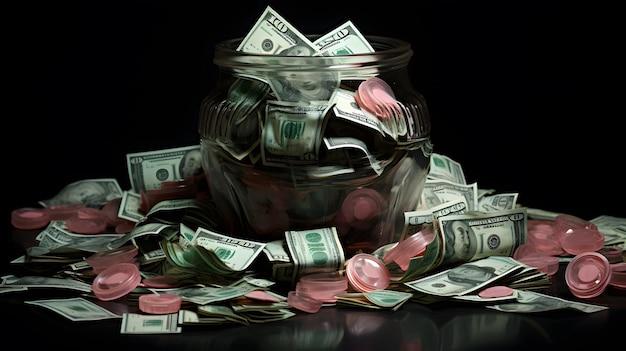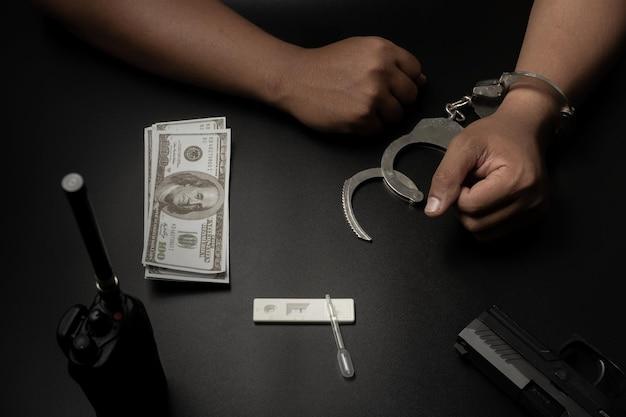Art has always pushed boundaries and challenged norms, but when it comes to using actual currency as a creative medium, a question arises: Is it illegal to make art out of money? In this blog post, we delve into the legalities surrounding this intriguing topic, addressing questions like can you tape money? Can you use real money in art? Is photo money illegal? And many more.
From drilling holes in coins to creating intricate jewelry, artists have found countless ways to incorporate money into their creations. However, before you grab your scissors or paintbrush, it’s crucial to understand the legal implications of such endeavors. We’ll examine the rules and regulations surrounding the use of currency in art, offering insights into what you can and cannot do in 2023.
Along the way, we’ll also explore fascinating topics, such as the value of rare coins and the legality of destroying money, as well as answer burning questions like how much cash you can legally carry and whether painting on coins is considered illegal. So, let’s dive deeper into the world where art and currency intersect, shedding light on the legality and possibilities of creating artwork out of money.
Is It Illegal To Make Art Out Of Money
The Legalities of Money Art
Artists have long pushed the boundaries of what is considered acceptable and legal in the pursuit of creative expression. But when it comes to making art out of money, things can get a little more complicated. So, is it illegal to make art out of money? Let’s dive into the legalities surrounding this intriguing question.
The Counterfeit Conundrum
One of the primary concerns when it comes to money art is the potential for counterfeit activity. Governments are understandably strict when it comes to protecting the integrity of their currencies. Creating art that looks too similar to real money can raise red flags and invite legal trouble.
Where the Line is Drawn
To determine the legality of money art, we need to consider what constitutes “defacing” or “mutilating” currency. In the eyes of the law, defacement typically refers to actions that render money unfit for circulation. This can include tearing, cutting, or otherwise altering the physical properties of the note.
Artistic Interpretations
While the legal language may seem straightforward, the interpretation of what qualifies as defacement is subjective. The intention behind the art and the extent of alterations play a crucial role in determining its legality. For example, minor alterations that do not interfere with the note’s usability are likely to be viewed more leniently than elaborate designs that mimic counterfeiting techniques.
The Art of Money
Many artists choose to incorporate money into their artwork without directly altering it. From collage to conceptual installations, money can be used as a symbolic element to explore themes of wealth, power, and consumer culture. In these cases, the legality of the art depends on the context and the artist’s intent.
Legal Troubles and Famous Cases
While there have been instances where artists faced legal repercussions for their money art, the outcomes vary greatly. Notable cases, such as J.S.G. Boggs and his hand-drawn currency, have sparked debates regarding the line between art and counterfeiting. Ultimately, it seems that the courts consider factors like intent, impact on the economy, and public perception when making their judgments.
So, is it illegal to make art out of money? The answer is not a clear-cut yes or no. While defacing or counterfeiting currency is undoubtedly against the law, there is room for artistic interpretation and expression when it comes to money art. Understanding the legal boundaries and being aware of the potential consequences are essential for artists who wish to explore this fascinating and controversial medium. As with any form of art, it’s always a good idea to consult legal experts to ensure compliance with local laws and regulations.
Frequently Asked Questions about Making Art Out of Money
Can you tape money
Yes, you can tape money, but be careful not to deface it in a way that renders it unusable. The United States Treasury defines defacement as any unauthorized markings or alterations that impair the currency’s condition and hinder its security features, like the serial numbers or watermarks. So, feel free to use tape, but keep it tidy!
Can you use real money in art
Absolutely! Using real money in art can add an intriguing twist to your work. However, there are some rules to follow. As long as the money is not altered to the point that it loses its value or purpose as a medium of exchange, you’re good to go. So, get creative and let those dollar bills enhance your masterpiece!
Is photo money illegal
Taking a picture of money is not illegal. In fact, you can photograph currency to your heart’s content, just make sure you don’t try to create counterfeit bills with those photos. Leave the printing to the professionals and focus on capturing the artistry of your subject through the lens!
How much is the 1943 copper penny worth
Ah, the elusive 1943 copper penny! Due to its rarity, this particular coin can fetch a pretty penny (pun intended). In recent years, collectors have been known to pay anywhere from $60,000 to $100,000 for a 1943 copper penny in good condition. So, if you happen to stumble upon one, consider yourself lucky!
Is destroying money illegal
While it may seem counterintuitive, destroying money is not technically illegal in the United States. However, there are limits. If you intentionally deface, mutilate, or render money unusable with the intent to render it unfit for circulation, you’ll likely find yourself in hot water. Remember, a little creativity is encouraged, but don’t go overboard!
Is it illegal to burn the Bible
No, it is not illegal to burn the Bible. In the United States, we enjoy the freedom of speech and expression. However, it’s important to note that burning any book, including the Bible, can be considered highly disrespectful and offensive to many people. So, while you have the right to do so, it’s generally best to ponder the consequences before sparking up the holy flames.
Is drilling a hole in a coin illegal
Drilling a hole in a coin is generally not illegal as long as it doesn’t deface the coin to the point where its value is compromised. In fact, many hobbyists enjoy turning coins into unique pieces of jewelry or accessories by skillfully drilling small holes. Just make sure not to drill too close to the edges, as it could weaken the coin’s structure.
Is it illegal to make stuff out of coins
No, it is generally not illegal to make stuff out of coins. Repurposing coins for creative purposes, such as jewelry or artistic sculptures, is a popular pastime for many people. However, remember not to alter the coins to the point where they become unusable or counterfeit. So, go ahead and let your imagination run wild, as long as it doesn’t land you in legal trouble!
Is a penny floor illegal
A penny floor is not illegal, per se, but it may raise some concerns when it comes to fire safety regulations. Additionally, keep in mind that any modifications you make to your property, such as adhering thousands of pennies to the floor, should comply with local building codes and regulations. So, if you’re considering a penny floor, it’s best to consult with the appropriate authorities before jumping into the penny-adhesive madness!
Is it illegal to use coins in jewelry
Using coins in jewelry is not illegal as long as you don’t alter the coins to the point where their denomination or value is rendered unreadable or compromised. Many artisans create beautiful and unique pieces by incorporating coins into their designs. So, dazzle with your creativity and let those coins shine in all their fashionable glory!
How rare is a 1943 copper penny
A 1943 copper penny is an incredibly rare find. Due to a shortage of copper during World War II, most pennies were minted in zinc-coated steel. However, a small number were mistakenly minted on copper planchets, making them extremely valuable to collectors. Only a few dozen confirmed specimens are known to exist, making the 1943 copper penny a numismatic treasure!
Is it legal to clean coins
Yes, it is legal to clean coins. However, if you’re dealing with valuable or historical coins, cleaning may significantly affect their numismatic value. Cleaning can potentially damage the surface and patina of the coin, reducing its desirability among collectors. It’s generally best to consult with a professional before embarking on a coin-cleaning adventure.
What can I do with a penny
Ah, the humble penny! Despite its low value, there are plenty of creative options for pennies. You can collect them, create unique pieces of jewelry or art, use them for educational purposes, or even give them a second chance at life by donating them to charitable organizations. Pennies may be small, but their potential for recycling and repurposing is vast!
Can I destroy my own money
You can destroy your own money, but why would you want to? Remember, your hard-earned cash has value, both monetarily and as a representation of your labor. Rather than destroying it, consider saving, investing, or donating it to a worthy cause. Let’s keep the destruction limited to our opponents in a friendly game of Monopoly instead!
How much cash can you carry legally
You can carry as much cash as you want legally in the United States. However, if you’re traveling internationally, it’s important to be aware of the regulations in your destination country. Some nations may require you to declare large amounts of cash upon arrival. So, if you’re planning to be a high roller abroad, do your research beforehand!
Can I use pennies for art
Absolutely! Pennies can be a fantastic medium for art projects. Their copper hue adds warmth and character to any creation. However, keep in mind that altering or damaging coins so that they become unfit for circulation is generally not encouraged. So, embrace the penny’s artistic qualities while respecting its intended purpose as a form of currency!
Is it illegal to sell coin rings
Selling coin rings is generally not illegal, as long as the coins are modified without violating regulations that would render them counterfeit or unusable. However, it’s essential to familiarize yourself with the laws and regulations regarding the sale of modified coins in your specific jurisdiction. Knowledge is power, especially when it comes to peddling those awesome coin rings!
Is copying paper money illegal
Yes, copying paper money, or any form of counterfeiting, is illegal. The United States government takes currency counterfeiting seriously to protect the integrity of the nation’s monetary system. So, if you’re gifted with artistic talent, let those skills shine in original creations rather than attempting your own monetary forgery. We wouldn’t want you spending your days behind bars, doodling on cell walls!
What coin is illegal to own
In the United States, there are no coins that are explicitly illegal to own. However, there are various laws and regulations regarding certain types of coins, such as rare or historical ones. It’s crucial to familiarize yourself with any restrictions before adding coins to your collection. Stay informed, stay out of trouble, and let your coin kingdom grow!
Is painting on coins illegal
Painting on coins is not illegal as long as the paint doesn’t deface or cover the coin’s important features, such as the denomination or date. Artists often showcase their creativity by adding intricate designs to coins, transforming them into miniature works of art. Just remember to keep your brushstrokes delicate and respectful of the coin’s original identity!

